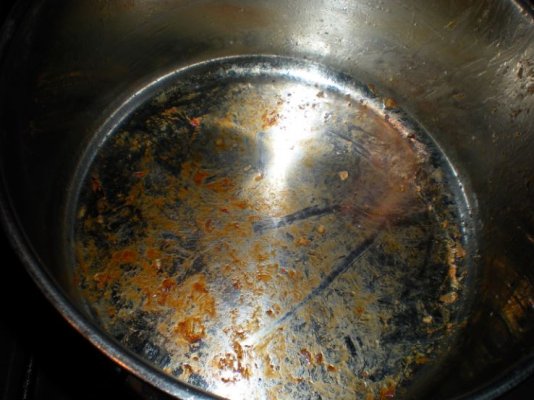Roll_Bones
Master Chef
Good informative thread.
I had similar issues with my 20 year old Calphalon anodized AL pans. At first I was very disappointed and had buyers remorse.
SS was what most of my friends and what the chefs on TV used. But watching short order cooks using AL pans helped me to decide on anodized AL.
I learned the hard way what was explained in this thread.
I do disagree with Chief Longwind.
AL pans must be kept spotless just like SS. In fact the manufacturer (Calphalon) recommends using "scotch brite" pads for cleaning and there are AL cleaning pastes available for AL.
Once I learned to clean properly and cook properly on AL, my life became much easier.
A dirty AL pan is no different than a dirty SS pan. Seasoning is not required for AL or SS as cast iron is. A clean (spotless) pan is the only way to work with AL or SS.
My experience with AL is only with Calphalon anodized and the commercial saute pan like they use at Waffle house. Its the pan they make their eggs and omelet's in.
I am so glad I found this forum. And I hope my initial brashness will be excused.
I had similar issues with my 20 year old Calphalon anodized AL pans. At first I was very disappointed and had buyers remorse.
SS was what most of my friends and what the chefs on TV used. But watching short order cooks using AL pans helped me to decide on anodized AL.
I learned the hard way what was explained in this thread.
I do disagree with Chief Longwind.
AL pans must be kept spotless just like SS. In fact the manufacturer (Calphalon) recommends using "scotch brite" pads for cleaning and there are AL cleaning pastes available for AL.
Once I learned to clean properly and cook properly on AL, my life became much easier.
A dirty AL pan is no different than a dirty SS pan. Seasoning is not required for AL or SS as cast iron is. A clean (spotless) pan is the only way to work with AL or SS.
My experience with AL is only with Calphalon anodized and the commercial saute pan like they use at Waffle house. Its the pan they make their eggs and omelet's in.
I am so glad I found this forum. And I hope my initial brashness will be excused.
Last edited:



